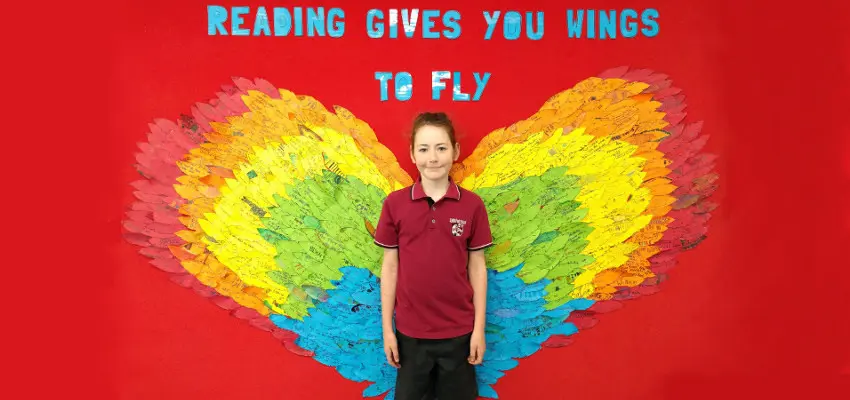Learning about raising readers at Sylvia Park School

Reading gives you wings. All rights reserved.
Read how Services to Schools' 'Raising readers' online course helped Teacher Librarian Esther Casey support reading in her school library and develop her professional practice.
Introducing Esther
Esther Casey is the Teacher Librarian at Sylvia Park School with about 530 years 0–8 students in Mt Wellington, Auckland. Their newly refurbished library, Te Puna Ngoi, was opened in 2017.
Esther participated in National Library Services to Schools' Raising readers online course. We asked Esther to give us her perspective on the online course and to share how this form of professional development worked for her.
Here's what she had to say...
Esther's reflection about the online course
Reflecting on the course, I can identify some key aspects that I found particularly effective for developing my professional practice.
The balance of research and action
This course had a really good balance between both what the research tells us as well as planning for action to make a practical difference. I find that I am often drawn to the action aspects of professional development, thinking about the activities and changes I can make to what I do, but this course integrated the research throughout which gave actual initiatives a strong and compelling evidence base.
The role of the facilitator in the course
A great feature of the Raising readers course was the absolute presence of the National Library facilitator throughout the course. It felt like she was there, 'in the room' with us whenever we needed her, reading our contributions, processing and crafting responses, and extending our learning. It helped us feel supported and engaged, kept momentum going with the course over the 6 weeks, and helped us connect with the content, additional resources, and each other.
Time management
The course was asynchronous so I could go online when it suited me. I scheduled regular times to go into the course, with a core 2-hour block each Friday. The flexibility of online learning means it is feasible to fit it in around my work and out-of-work commitments.
Professional learning
A key factor for the success of any professional development is taking ownership of one’s own learning, and recognising that part of being a professional is making the most of opportunities to upskill and to stretch one’s ideas. Regular professional development (PD) just needs to be 'part of what we do', and online courses such as this means that PD is much more accessible now, whatever our location or timetable.
We all do 2 rounds of teacher inquiries at our school as part of our professional learning and appraisal, and for my appraisal, I used the outcomes from the Raising readers course. I slotted the process into the spiral of inquiry framework, which it did beautifully. It felt like such an authentic and robust way of connecting my professional development experience to my appraisal.
Outcomes-focused
All the ideas I gained from the course and from all the other participants will keep me going for ages!
It was good for me to realise that initiatives and outcomes don’t necessarily need to be huge. They can be something quite targeted and specific, adding to the overall impact on teaching and learning. It was also useful to be able to focus on something in particular and appropriate for my school — something that would suit my community. The outcome-based approach was flagged early on in the course, so we all knew that we needed to be considering what we would do to make a difference. I focused on a couple of areas:
an infographic illustrating why reading is important
sharing student and staff video stories about reading.
My infographic
I created an infographic illustrating why reading is important, based on the research, in a visually appealing, readily understood format. I shared this with staff, students, and families, face-to-face and online. It turned out to be an excellent conversation starter about reading-for-pleasure practice at school and at home, and ways the library supports this.
My infographic included a QR code and a reference to my school’s library. This is a generic version referring to school libraries generally, and with a Creative Commons licence for sharing:
Kids who choose to read (pdf, 1.2MB)
Video stories
I am now regularly filming students and teachers sharing their favourite books, reading memories, participation in library activities, and what is special and important about being a reader. I share these videos at school assemblies. As well as the benefits for our student audience, I’ve found that interviewing teachers, and making it clear how incredibly important they are as reading role models, has had a real ripple effect in terms of them making their reading-for-pleasure practice more explicit for their students.
School leadership support
I always find it useful to get school leadership involved with any library initiatives as much as possible. It is helpful for aligning with common goals, having a sounding board, taking a strategic approach, and embedding any initiatives across the whole school.
This National Library Services to Schools' professional development provided a good opportunity to have conversations with school management about the library’s contributions to our school’s reading culture and our literacy, learning, and community connection goals.
Related content
Professional learning and support